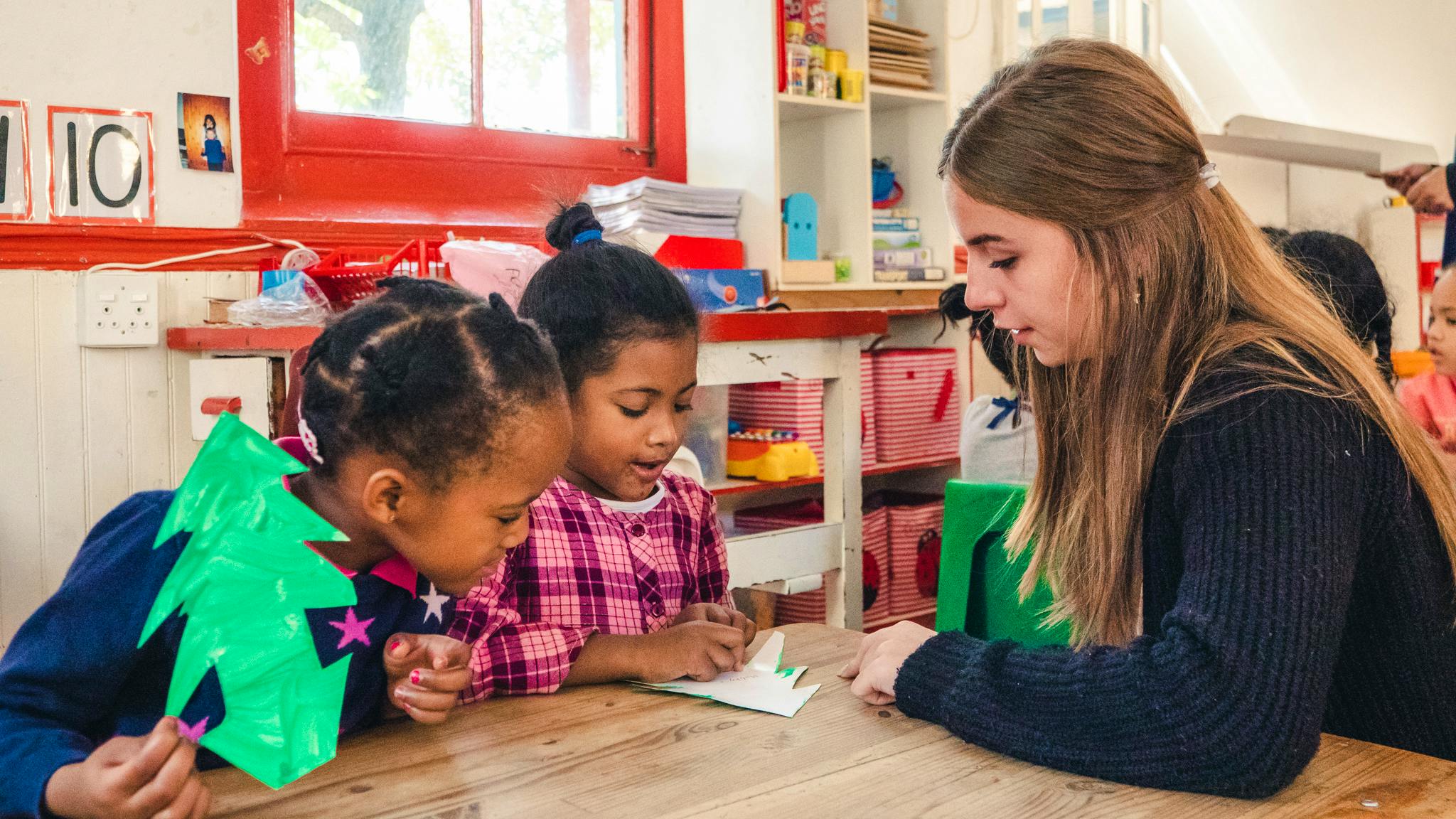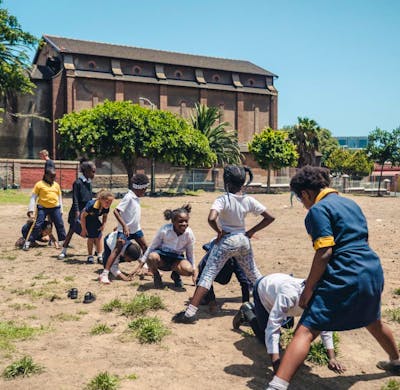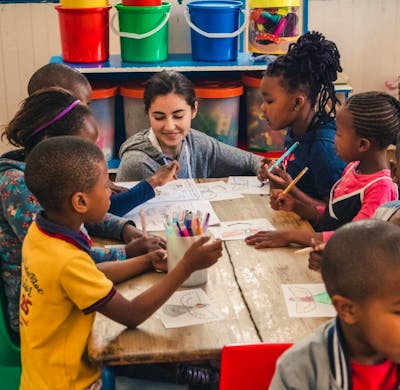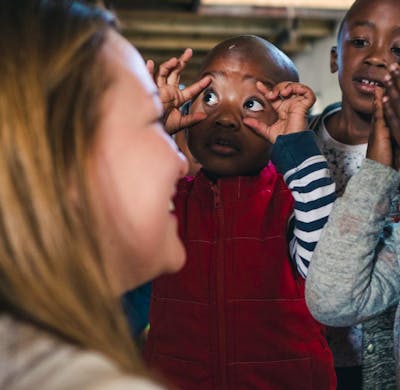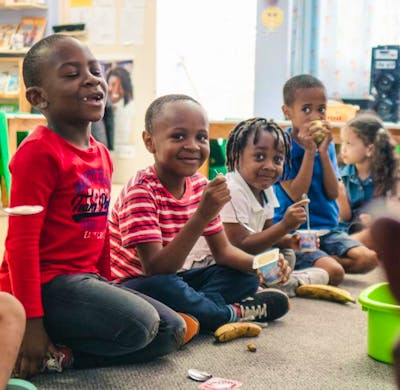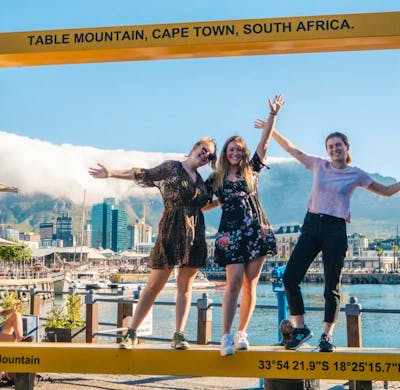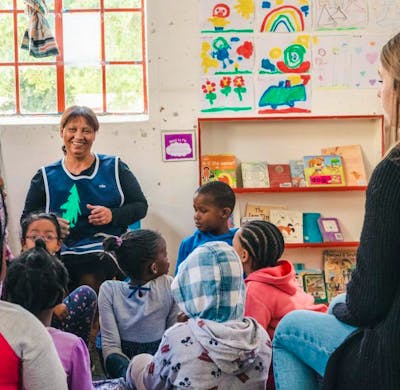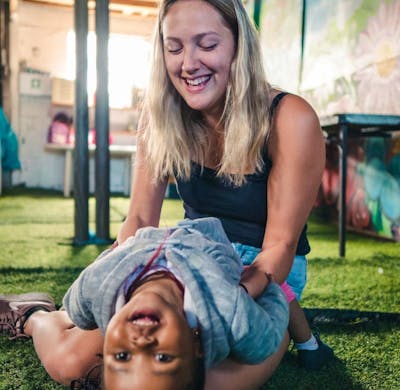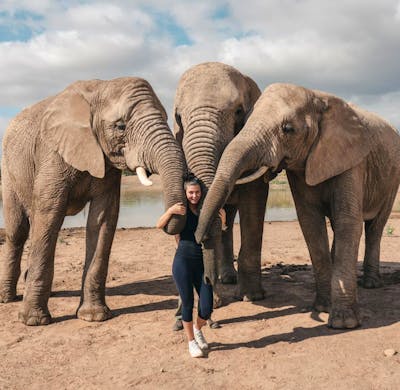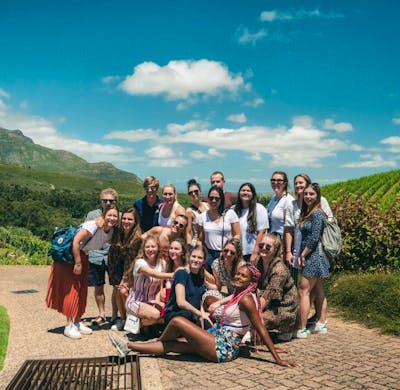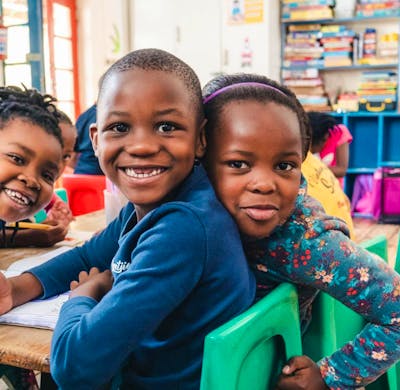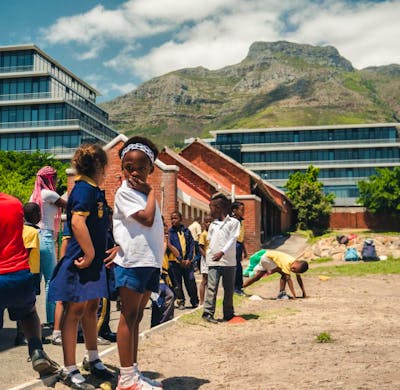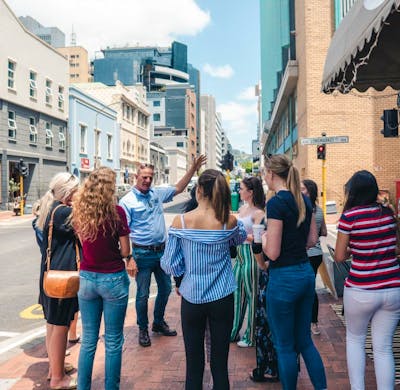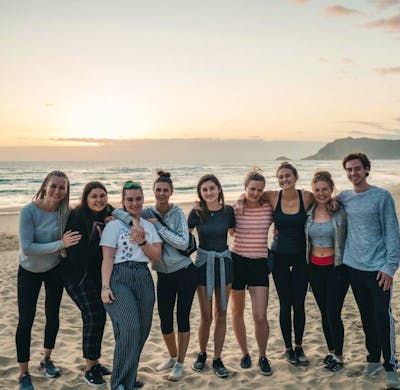As a volunteer teaching English in South Africa, you will play a vital role in developing local children's English skills. Consequently, as the students' English levels improve, so will their prospects. PMGY’s South Africa volunteer programs will see you help young children in Cape Town. Teach English in South Africa and a range of other subjects to underprivileged children from government schools. All within the stunning setting of cosmopolitan Cape Town.
BACKGROUND TO THE TEACHING PROGRAM
South Africa has 11 official languages. It is a nation with huge potential. Much of its future hope lies with the youth of this great country. Huge steps have been taken by the post-apartheid regime to implement a fully inclusive and comprehensive education system for all. However, the sad reality is that the quality of education received is largely dependent on location and family wealth.
Those with high-income families and a low cost of living correlate to more prosperous opportunities. Examples include private school and language school learning opportunities. Consequently, direct gateways are provided for children of a more advantageous background to get the top jobs in South Africa.
On the other hand, many young ones from disadvantaged communities don’t have it so easy. More specifically, they don’t receive a sufficient level of education to prepare them for the future. Furthermore, the influx of refugees to emerging cities such as Cape Town is causing further conflicts. In the same vein, extra burdens are being placed on already under-resourced and overcrowded government schools. Most classrooms are filled with 40+ children to only one local teacher.
Many of the children that attend public schools we support come from broken homes. These are places where criminality and illiteracy are commonplace. Far too many children become a product of their environment and so become largely disengaged with formal education.
The further difficulty lies in the fact that the schools seriously lack the manpower and the resources to tackle these issues. In addition, the schools will offer little or no recreational activities to help integrate some of the less enthusiastic learners.
PMGY South Africa volunteers assist primary schools in and around the popular tourist destination of Cape Town. The children are aged 6-13. Primary school teaching will be largely focused on core subjects such as maths, art and science. Above all, there is a focus on students to improve in English.
The primary schools are government-based. In addition, class sizes vary from 15-40 pupils and ages from around 5-12 years old. As a volunteer teaching English in South Africa, you can expect to participate in the following activities. For example, supporting with lesson planning and execution as well as one-on-one support for students.
Furthermore, as a volunteer teacher in South Africa, you may be required to substitute for the main teacher. Other tasks expected when you teach in South Africa include leading physical education lessons and administration duties. In addition to this, you will be assisting with fundraising and annual functions/events.
Volunteer opportunities provided by PMGY offer a platform to make a positive impact when you teach English in South Africa. When working at our volunteer teaching English abroad projects in South Africa, it is important to maintain energy, enthusiasm and creativity. Many of these students will benefit from having someone who is fluent in the English language teaching them in South Africa. As a volunteer teaching English in South Africa, you will need to donate your time and skills effectively. This is to ensure you can maximise your impact on the local people. If you need motivation for gap year volunteering, then our projects in South Africa provide some fantastic options.
TEACHING VOLUNTEER PLACEMENT EXAMPLES
Chapel Street Primary School - The majority of the 800 students who attend Chapel Street Primary come from disadvantaged local communities. For instance, many of the students arrive at the school from the townships of Cape Town that suffer great poverty. This means that classrooms are often overcrowded and resources limited.
With only 24 staff members, the approximate ratio is 1 teacher to 30-40 students. Despite this strain, the teachers do their utmost to combat the economic and social hardships the learners face. Typically, teachers achieve this through education, information and communications technology.
Most of the students who attend the school are between 6-13 years of age. Firstly, the volunteers primary role is to assist the local teachers in the classroom. Secondly, volunteers will also be expected to lead lessons and support sports education. Finally, volunteers may also have the opportunity to help with swimming lessons and art classes. PMGY volunteers provide invaluable support to overburdened local teachers and can build great bonds with the students along the way.
St. Pauls Primary School - Located in the iconic and historic Cape Malay community of Bo-Kaap, St. Pauls primary school is surrounded by colourful houses and steep cobblestone streets. The school is conveniently located within walking distance of the Cape Town city centre. However, most of the students come from townships. These are areas that are home to some of the city’s most impoverished communities. Most noteworthy, these townships often face challenges such as substance abuse and high crime rates. Consequently, schools such as St. Pauls Primary are often seen as ‘places of safety’ for these children.
Volunteers at this school are placed in the younger/lower grades with children aged between 6-8 years. For these students, the focus is placed on language, basic math, art/music and physical education. Volunteers who teach English in South Africa largely work as teaching assistants. Tasks include coordinating tasks such as reading groups and performing admin duties. In addition, teaching jobs will also see you work one-on-one with students who require an additional hand. Occasionally, volunteers may be allowed to lead their class. Moreover, volunteers may also be called upon to help in older classes.
OTHER THINGS TO CONSIDER TEACHING CHILDREN IN SOUTH AFRICA
Return Airport Transfer - Your return airport transfer is not included in your Program Fee. Our local team can help arrange onward transfers to the airport or an alternative destination from the volunteer accommodation. Making specific arrangements once in South Africa provides more flexibility as plans can often change and participants may be on similar flight plans. Alternatively, a more common and cheaper method is to use a ridesharing app. Participants can often be travelling across their final few days and therefore are not necessarily heading back to the airport directly from our accommodation. The costs depend on your method of transport and your final destination. This can often be split across multiple participants if you are travelling with someone else on the program. Uber tends to be a safe and convenient option for volunteers. It is strongly advised not to travel by public transport back to the airport. Whilst this may be cheaper, it is far less convenient and comes with additional safety risks.
Experience - For the English Teaching program, teaching experience is not essential as the mere presence of a native English speaker is invaluable. As long as you are creative, determined and resourceful you can have a constructive impact on the development of the children’s education.
TEFL Course - We encourage volunteers to prepare as much as possible for their teaching program overseas. You can make the most out of your time by completing our convenient, inexpensive and international accredited 60 hour Online TEFL Course. The cost of this course is only 150 USD.
Township Projects - Please note, that most projects we support are centrally based in the city within Cape Town. Projects in the township area represent a much more challenging experience both logistically and structurally.
Consequently, we do not promote or endorse projects in these locations. Should volunteers wish to experience projects in the townships this may be arranged on an ad hoc basis. This is dictated by the discretion of the local team. Volunteers are best to discuss such options with the team upon arrival in South Africa.
Project Locations - The daycare and school settings we support are based in the city centre; however, many children come from townships with limited resources. So, children often come from low-income areas, where it is common for their parents’ employers to subsidise their childcare or school fees. The involvement of overseas volunteers brings invaluable support and enthusiasm, making a profound difference in children’s early education. A volunteer’s extra effort, whether helping a child catch up or improving their English skills, can significantly enhance their understanding and, in turn, their future employability.
Resources - On the teach English in South Africa project, resources can be very limited. Volunteers are recommended to bring materials to the project each day to maximise their productivity and day to day involvement. It is therefore important for volunteers to prepare well in advance to get the most out of their teaching English project experience.
Wildlife Reserve Volunteer Extension - PMGY participants joining us in Cape Town have the opportunity to extend their trip by joining our wildlife reserve project located near Port Elizabeth. You can join for a period of 1 week+ to maximise your experience in South Africa and get involved in this unique opportunity. Participants will need to fly from Cape Town to Port Elizabeth on the Monday following the completion of their first program and the one-way domestic flight is included within the extension price.
Weekends - Your project work in South Africa runs from Monday-Friday and weekends are free. You are welcome to relax and hang out at the volunteer accommodation but most participants will use this time to travel and explore the country. As a result, you can check out our South Africa Weekend Travel Guide for top tips on how to spend your weekend.
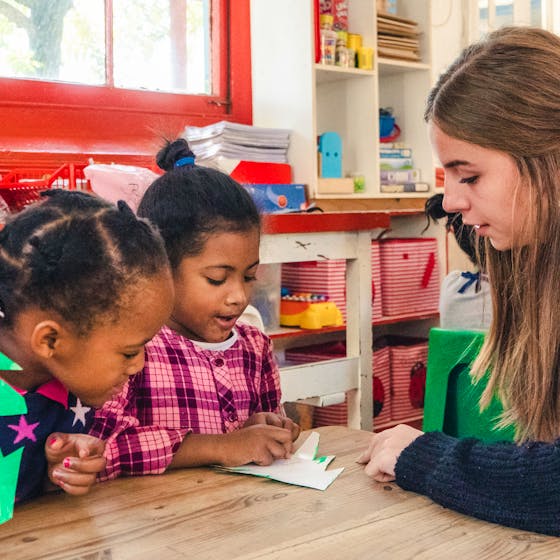
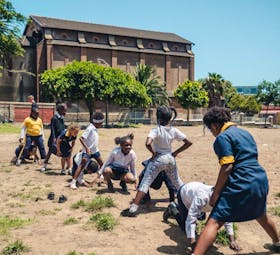
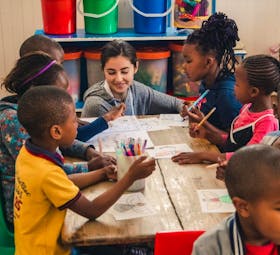

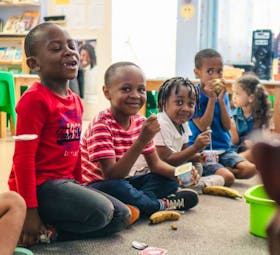
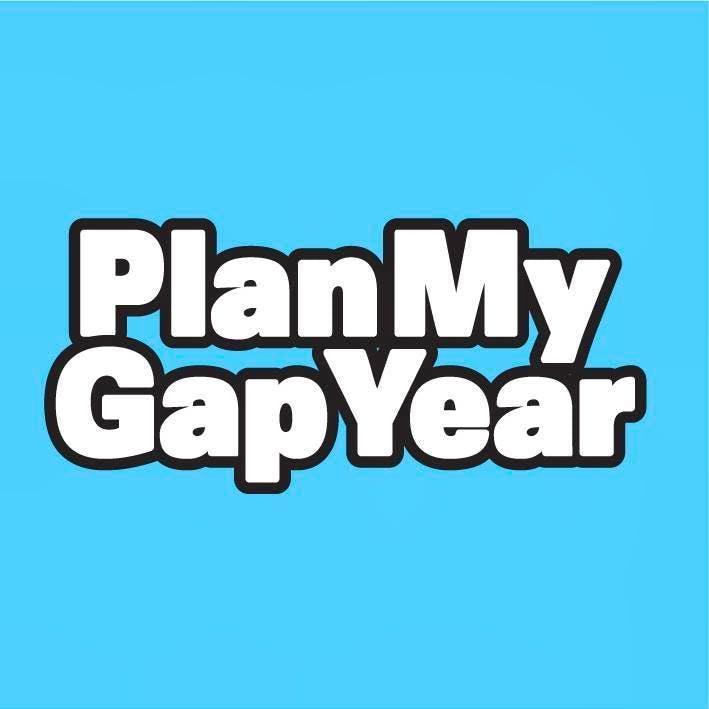
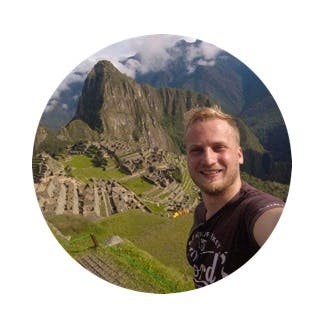
 4.9
4.9

